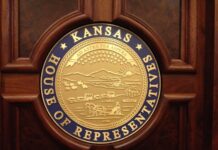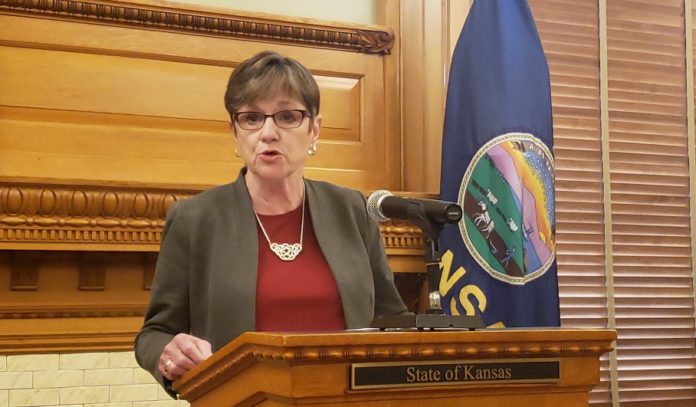Gov. Laura Kelly on Thursday vetoed legislation requiring a civics test, a financial literacy course and development of a National Rifle Association-based firearm safety course for students.
Reiterating concerns about the legislation expressed during the session, Kelly said the bills violated the Kansas State Board of Education’s constitutional authority to generally supervise the school system.
“The Kansas Constitution endows our state Board of Education with the authority to set the curriculum for our public schools,” Kelly said in a statement.
“We should let the state Board of Education do that job, not the Legislature. This is legislative overreach. I encourage the Legislature to work with the State Board of Education to modify curriculum.”
Kelly’s veto came about a week after the Board of Education passed a resolution asking the governor in an indirect way to veto the bills.
Republican state Rep. Steve Huebert said he wouldn’t give up on the legislation, promising to look for ways to get the legislation added to other education policy bills that could be debated during the wrapup session.
If there were questions about the legality of the bill, then why did Attorney General Derek Schmidt back the legislation, Huebert said.
“This veto is not what’s best for our kids,” he said. “It’s about protecting turf, I guess, instead of doing what’s best for kids.
“This is issue will be one of the reasons that in 18 months from now, we’ll be electing a Republican governor.”
The Kansas National Education Association urged the Legislature not to override the governor’s veto on the education bills.
“Both House bills would usurp the constitutional authority of the elected members of the state Board of Education,” said KNEA spokesman Marcus Baltzell.
“Such decisions are best left in the hands of those charged with the general supervision of the state’s system of public education as spelled out in the Kansas Constitution.”
Kelly vetoed one bill requiring Kansas students to pass an American civics test to graduate from high school as well as pass a financial literacy course.
The civics test would be made up of 60 questions selected from the naturalization test administered by U.S. Citizenship and Immigration Services.
The bill also requires a personal financial literacy course for grades 10 through 12 that would last at least one semester or two quarters.
The bill would require the course to include topics ranging from saving and investing to
credit and debt to financial responsibility and money management.
Students wouldn’t have to pass the civics test until the 2022-23 school year.
The bill would require students to pass the financial literacy course for graduation starting in the 2024-2025 school year.
The House passed the civics bill 72-51. It was approved 25-13 in the Senate. Both votes are short of overriding the veto.
A second bill would require the state Board of Education to develop guidelines for gun-safety education that would include the National Rifle Association-crafted Eddie Eagle GunSafe program.
It was sponsored by Republican state Rep. Patrick Penn.
“Laura Kelly vetoed firearm safety education for young people,” Penn said.
“She is beholden to the unions and chose them over the safety of our children.”
Critics had said using the NRA class was tantamount to promoting the organization.
They related Eddie Eagle to “Joe Camel with feathers.”
Penn said Eddle Eagle was not an endorsment of the NRA.
“Everybody is up in arms about NRA and that’s unfortunate,” Penn said.
“You’re not endorsing that. What you’re doing is protecting the kids. They’re focusing on the wrong thing,” he said.
The bill would have required gun-safety courses for students from kindergarten to fifth grade to be based on the Eddie Eagle program or any “successor program.”
Firearms safety courses for students in the sixth through eighth grades would be based on the Eddie Eagle program and hunter education classes offered by the Kansas wildlife department.
Students in grades nine through 12 could take classes based on the hunter education courses offered by the wildlife department. The Board of Education or local school districts could designate other gun-safety progams offered by the agency.
The Eddie Eagle bill passed 31-7 in the Senate and 79-44 in the House. The Senate has the votes for a veto override but the House is five short.















